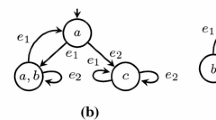Abstract
The linear reachability problem is to decide whether there is an execution path in a given finite state transition system such that the counts of labels on the path satisfy a given linear constraint. Using results on minimal solutions (in nonnegative integers) for linear Diophantine systems, we obtain new complexity results for the problem, as well as for other linear counting problems of finite state transition systems and timed automata. In contrast to previously known results, the complexity bounds obtained in this paper are polynomial in the size of the transition system in consideration, when the linear constraint is fixed.
Access this chapter
Tax calculation will be finalised at checkout
Purchases are for personal use only
Preview
Unable to display preview. Download preview PDF.
Similar content being viewed by others
References
R. Alur and D. L. Dill. A theory of timed automata. Theoretical Computer Science, 126(2):183–235, April 1994.
R. Alur and T. A. Henzinger. A really temporal logic. Journal of the ACM, 41(1):181–204, January 1994.
A. Biere, A. Cimatti, E. Clarke, and Y. Zhu. Symbolic model checking without BDDs. In TACAS’99, volume 1579 of LNCS, pages 193–207. Springer-Verlag, 1999.
I. Borosh, M. Flahive, and B. Treybig. Small solutions of linear diophantine equations. Discrete Mathematics, 58:215–220, 1986.
I. Borosh and B. Treybig. Bounds on positive integral solutions of linear diophantine equations. Proceedings of the American Mathematical Society, 55:299–304, 1976.
A. Bouajjani, R. Echahed, and P. Habermehl. On the verification problem of nonregular properties for nonregular processes. In LICS’95, pages 123–133. IEEE CS Press, 1995.
E. M. Clarke, E. A. Emerson, and A. P. Sistla. Automatic verification of finite-state concurrent systems using temporal logic specifications. TOPLAS, 8(2):244–263, 1986.
H. Comon and Y. Jurski. Timed automata and the theory of real numbers. In CONCUR’99, volume 1664 of LNCS, pages 242–257. Springer, 1999.
Zhe Dang. Binary reachability analysis of pushdown timed automata with dense clocks. In CAV’01, volume 2102 of LNCS, pages 506–517. Springer, 2001.
Zhe Dang, O. H. Ibarra, T. Bultan, R. A. Kemmerer, and J. Su. Binary reachability analysis of discrete pushdown timed automata. In CAV’00, volume 1855 of LNCS, pages 69–84. Springer, 2000.
Zhe Dang, O. H. Ibarra, and P. San Pietro. Liveness Verification of Reversal-bounded Multicounter Machines with a Free Counter. In FSTTCS’01, volume 2245 of LNCS, pages 132–143. Springer, 2001.
Zhe Dang, P. San Pietro, and R. A. Kemmerer. On Presburger Liveness of Discrete Timed Automata. In STACS’01, volume 2010 of LNCS, pages 132–143. Springer, 2001.
E. Domenjoud. Solving systems of linear diophantine equations: an algebraic approach. In MFCS’91, volume 520 of LNCS, pages 141–150. Springer-Verlag, 1991.
Matthew B. Dwyer, George S. Avrunin, and James C. Corbett. Patterns in property specifications for finite-state verification. In ICSE’99, pages 411–421. ACM Press, 1999.
G. J. Holzmann. The model checker SPIN. TSE, 23(5):279–295, May 1997.
J. Hopcroft and J. Ullman. Introduction to Automata theory, Languages, and Computation. Addison-Wesley Publishing Company, 1979.
K.L. McMillan. Symbolic Model Checking. Kluwer Academic Publishers, Norwell Massachusetts, 1993.
Tadao Murata. Petri nets: Properties, analysis and applications. Proceedings of the IEEE, 77(4):541–580, 1989.
R. Parikh. On context-free languages. JACM, 13:570–581, 1966.
A. Pnueli. The temporal logic of programs. In FOCS’77, pages 46–57. IEEE CS Press, 1977.
L. Pottier. Minimal solutions of linear diophantine equations: Bounds and algorithms. In Rewriting Techniques and Applications, volume 488 of LNCS, pages 162–173. Springer-Verlag, 1991.
M. Y. Vardi and P. Wolper. An automata-theoretic approach to automatic program verification (preliminary report). In LICS’86, pages 332–344. IEEE CS Press, 1986.
Author information
Authors and Affiliations
Editor information
Editors and Affiliations
Rights and permissions
Copyright information
© 2003 Springer-Verlag Berlin Heidelberg
About this paper
Cite this paper
Xie, G., Li, C., Dang, Z. (2003). New Complexity Results for Some Linear Counting Problems Using Minimal Solutions to Linear Diophantine Equations. In: Ibarra, O.H., Dang, Z. (eds) Implementation and Application of Automata. CIAA 2003. Lecture Notes in Computer Science, vol 2759. Springer, Berlin, Heidelberg. https://doi.org/10.1007/3-540-45089-0_16
Download citation
DOI: https://doi.org/10.1007/3-540-45089-0_16
Published:
Publisher Name: Springer, Berlin, Heidelberg
Print ISBN: 978-3-540-40561-0
Online ISBN: 978-3-540-45089-4
eBook Packages: Springer Book Archive




